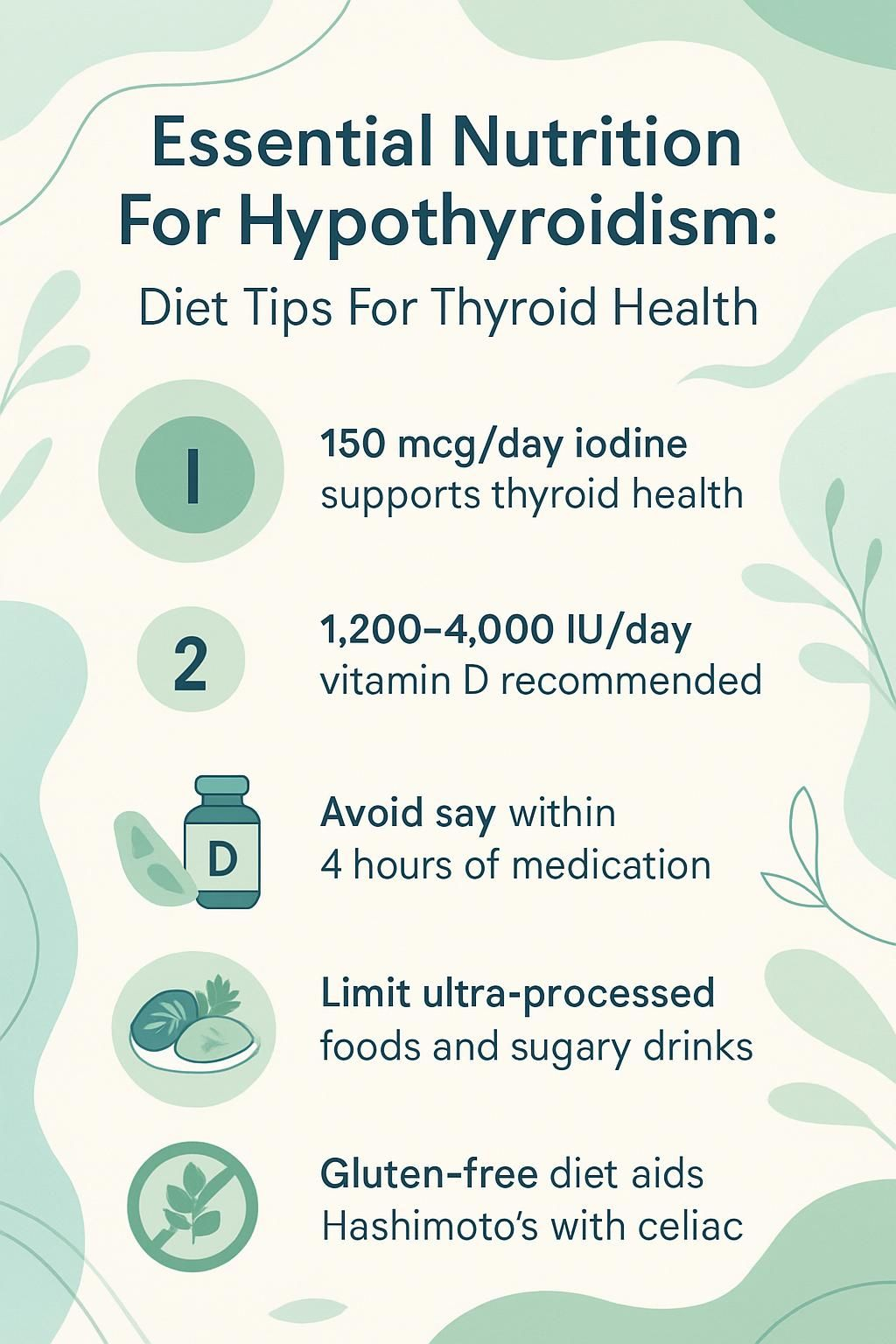Essential Nutrition For Hypothyroidism: Diet Tips For Thyroid Health
Our Nutrition Assistant AI Suite will transform your body. You will lose fat, get toned, and build muscle. Gain confidence and optimal health.
If you live with hypothyroidism, daily fatigue, weight gain, or brain fog can feel relentless. Food choices will not cure an underactive thyroid, yet the right hypothyroidism diet can support thyroid function and help you feel steadier.
Scientists highlight several nutrients that matter for an underactive thyroid, including iodine, selenium, zinc, vitamin D, iron, B vitamins, and magnesium. This guide explains what to eat, what to limit, and how certain foods and supplements can affect thyroid medication.
Find simple steps you can use today. Small, steady changes can make living with hypothyroidism easier.
Key Takeaways
- A balanced diet with iodine, selenium, zinc, vitamin D, iron, B vitamins, and magnesium supports thyroid hormone production in hypothyroidism (EFSA; NIH).
- Iodized salt prevents most iodine deficiency in developed countries. One gram of seaweed can exceed the daily iodine need by several times.
- Ultra-processed foods and sugary drinks raise inflammation and can worsen weight and metabolic problems linked to hypothyroidism (American Thyroid Association; Mayo Clinic).
- Soy can reduce levothyroxine absorption. Keep at least a four-hour gap between soy foods and thyroid medicine (Mayo Clinic review).
- About 16 percent of people with Hashimoto’s also have celiac disease. If diagnosed or sensitive, a gluten-free diet may ease autoimmune symptoms.

Understanding Hypothyroidism

Hypothyroidism happens when the thyroid gland does not make enough thyroid hormones. These hormones guide metabolism, energy, and many body processes. Diet and daily habits can help you manage symptoms along with proper medical care.
What is hypothyroidism?
Low thyroid hormone levels lead to hypothyroidism, also called an underactive thyroid. Without enough hormone, metabolism slows. Women are affected more often than men.
Iodine deficiency is the leading cause worldwide. In the United States and many other countries, iodized salt has lowered this risk.
Common symptoms include tiredness, weight gain, dry skin, hair loss, depression, fertility issues, and constipation. Doctors often treat hypothyroidism with levothyroxine, a form of thyroid hormone replacement therapy.
Autoimmune thyroid disease, such as Hashimoto’s thyroiditis, is a frequent cause. The immune system attacks thyroid tissue, which lowers hormone output. A simple blood test can confirm diagnosis and guide care.
“Living with hypothyroidism can feel like moving through mud, but the right treatment and a balanced diet make a real difference.”
How does the thyroid gland affect the body?
The thyroid makes two main hormones, triiodothyronine, or T3, and thyroxine, or T4. These hormones influence energy, body temperature, heart rate, digestion, and how the body uses fats and carbohydrates.
Low hormone levels slow metabolism. You may feel cold, gain weight, have dry skin, or notice hair and mood changes. Cholesterol can rise, which increases heart risk over time.
During pregnancy, iodine deficiency can harm brain development in the child. Studies from Tasmania and the United Kingdom linked low iodine in pregnancy with lower IQ and school performance in children.
Nutrition supports thyroid function and can help you feel more alert. Medication remains the foundation, but smart food choices add helpful support.
The Importance of Nutrition for Thyroid Health
Nutrition and thyroid health connect closely. While food does not replace medicine, the right nutrients help the body make and use thyroid hormone effectively.
How does diet affect thyroid function?
Diet alone will not restore thyroid function in hypothyroidism. There is no proven “thyroid booster” food or special diet that raises hormone levels on its own, according to the American Thyroid Association and Mayo Clinic.
Still, daily eating patterns matter. Diets high in ultra-processed foods increase inflammation and oxidative stress. That can make symptoms worse over time. Some supplements and foods, such as large amounts of soy, can also interfere with medication when taken too close to your dose.
“A healthy eating pattern supports overall well-being but does not replace medical treatment for patients with hypothyroidism.”
American Thyroid Association
Aim for balanced meals that supply minerals and vitamins used for thyroid hormone production and energy. Focus on consistency, not quick fixes.
What nutrients are needed for thyroid hormone production?
The thyroid relies on several key nutrients: iodine, selenium, zinc, iron, vitamin D, vitamin B12, other B vitamins, and magnesium. Iodine is the main building block for thyroid hormones. Selenium supports enzymes that activate T3 from T4. Zinc helps both hormone production and hormone action in cells.
Iron helps convert T4 to T3 inside cells. Low iron can worsen symptoms and raise the risk of thyroid dysfunction. Vitamin D links to immune balance and is often low in autoimmune thyroid disease. B vitamins support metabolism and nerve health. Magnesium helps with many chemical reactions, including hormone production.
Together, these nutrients help your thyroid gland work efficiently. Later sections show how to get them from food and when to consider supplements.
Essential Nutrients for Hypothyroidism
Your thyroid needs a steady supply of certain vitamins and minerals. The goal is enough intake, not excess.
Why is iodine important and where can you find it?
Iodine is required to make thyroid hormones. Most adults need 150 micrograms per day. During pregnancy and breastfeeding, needs rise to 200 micrograms per day, according to EFSA.
Good sources include iodized salt, ocean fish, dairy, eggs, and seaweed like kelp. One gram of dried seaweed can contain several times the daily requirement, so keep portions small.
Low intake during pregnancy can affect a child’s brain development. Too much iodine can also trigger problems, especially in people with autoimmune thyroid disease. Using iodized salt in cooking and eating eggs or fish a few times per week often covers needs.
What role does selenium play and what are its food sources?
Selenium supports enzymes that activate thyroid hormone and protect the gland from stress. Low selenium is linked with a higher risk of Hashimoto’s thyroiditis.
Food sources include Brazil nuts, tuna, sardines, eggs, and legumes. One or two Brazil nuts can meet daily needs. Taking too much can be harmful. The safe upper limit is 400 micrograms per day, set by the NIH.
Supplement only if a healthcare professional recommends it. Most people can meet needs with food choices.
How does zinc benefit thyroid health and what foods contain it?
Zinc supports hormone production and use. Low zinc can worsen symptoms, including hair loss or slow wound healing.
Food options include oysters, fish, lean beef, poultry, legumes, dairy, nuts, and whole grains. Excess zinc can cause problems, so speak with a clinician before using supplements.
How does iron support thyroid function?
Iron helps convert T4 to active T3. Without enough iron, this step slows. Symptoms can worsen and lab levels can shift.
Women with low iron often show lower FT3 and FT4 and higher TSH. Iron deficiency is common in autoimmune conditions that affect absorption, such as gastritis or celiac disease.
Eat iron-rich foods like lean red meat, poultry, fish, beans, lentils, spinach, and fortified cereals. If you take iron and levothyroxine, separate them by several hours to avoid absorption issues.
Why is vitamin D important and which foods provide it?
Vitamin D works on thyroid receptors and helps regulate immune function. Many people with autoimmune thyroid disease are low in vitamin D.
Studies show that daily vitamin D, often 1,200 to 4,000 IU for several months, can reduce thyroid antibodies in people who are deficient. Food sources include salmon, mackerel, sardines, eggs, and fortified dairy or plant milks. Sunlight also helps. Ask your healthcare provider about testing and dosing.
What are the key functions of B vitamins in thyroid health?
B vitamins support energy metabolism, nerve function, and red blood cells. Vitamin B12 is often low in autoimmune hypothyroidism, which can add fatigue or tingling in hands and feet.
Food sources include dairy, eggs, lean meats, fish, whole grains, and leafy greens. If you struggle with low energy or numbness, discuss testing and a multivitamin or B12 supplement with your clinician.
How does magnesium support thyroid processes?
Magnesium acts as a cofactor in reactions that make T4 and T3. Low levels are linked with a higher risk of hypothyroidism and thyroid antibodies.
Good sources include nuts, seeds, legumes, leafy greens, and whole grains. A supplement can help if intake is low, but check with your healthcare provider first.
Foods to Include in a Hypothyroidism Diet
Build meals around whole foods that supply vitamins, minerals, fiber, and healthy fats. Think color, variety, and balance.
Which fruits and vegetables are best for thyroid health?
Fruits and vegetables provide fiber and antioxidants that support your cells and your gut microbiome. They also supply vitamins and minerals used in thyroid hormone production.
- Eat at least four servings of non-starchy vegetables daily, such as spinach, carrots, peppers, mushrooms, artichokes, asparagus, and zucchini.
- Choose fruits like berries, apples, citrus, pears, peaches, bananas, pineapple, and grapes for vitamin C and protective plant compounds.
- Include starchy vegetables, such as sweet potatoes and potatoes, in moderate amounts for potassium and B vitamins.
- Cruciferous vegetables, like broccoli or cabbage, are fine in small or cooked portions. Cooking lowers goitrogen content.
- Leafy greens provide magnesium, which supports hormone production and enzyme function.
How do whole grains support metabolism and energy?
Whole grains deliver steady energy and fiber. That helps ease constipation, a common symptom of hypothyroidism.
- Pick brown rice, oats, and quinoa for slow-release carbs and better blood sugar control.
- Fiber supports digestion and may help manage weight.
- B vitamins in whole grains support energy production. Some grains also contain selenium and magnesium.
- Gluten-free options like quinoa or brown rice work for those with celiac disease or gluten sensitivity.
- Limit refined grains to lower inflammation and protect heart health.
What lean proteins are beneficial for hypothyroidism?
Protein helps maintain muscle and supports a steady metabolism. Mix animal and plant sources to cover all amino acids.
- Fish such as salmon, cod, and tuna provide protein, iodine, selenium, and omega-3 fats.
- Skinless chicken and turkey deliver lean protein with little saturated fat.
- Eggs offer protein along with vitamin D, iodine, and selenium.
- Shellfish like shrimp and crab add zinc and selenium.
- Beans and lentils supply plant protein and fiber to support gut health.
- Yogurt and cottage cheese offer protein and calcium. Choose plain varieties.
- Lean red meats like sirloin or pork tenderloin add iron and zinc. Enjoy in moderation.
- Nuts and seeds contribute protein, healthy fats, and magnesium.
- Combining plant and animal proteins can match personal preferences, including gluten-free or vegetarian plans.
- Pair protein with vegetables and whole grains to stabilize blood sugar and energy.
- Vary sources through the week to stay satisfied and meet nutrient needs.
Which healthy fats should be included in the diet?
Healthy fats support hormone production and help absorb fat-soluble vitamins A, D, E, and K. They also help reduce inflammation.
- Olive oil supplies monounsaturated fats for heart and thyroid support.
- Avocados offer omega-9 fats and antioxidants that support cell health.
- Coconut oil contains medium-chain fats that can support energy for some people.
- Fatty fish provide omega-3s linked to lower inflammation.
- Plain yogurt supplies healthy fats and iodine. Check for added sugars.
- Nuts and seeds, including pumpkin seeds and almonds, add zinc, selenium, and magnesium.
- Natural nut butters add healthy fats and help with nutrient absorption.
- Chia and flaxseed provide plant omega-3s for thyroid support.
- Watch portions since fats are calorie dense. Aim for 20 to 35 percent of calories from healthy fats.
- Choose fats from whole foods more often than refined oils.
What are good iodine-rich food options?
Iodine keeps thyroid hormone production on track. Aim for enough, not excess.
- Seaweed, such as kelp and dulse, is very high in iodine. Keep servings small.
- Dairy products like milk, yogurt, and cheese contribute iodine. One cup of milk has about 56 micrograms.
- Eggs, especially the yolk, add iodine. One large egg has about 24 micrograms.
- Ocean fish, such as cod and tuna, supply natural iodine. Three ounces of baked cod has about 99 micrograms.
- Iodized salt helps most adults reach 150 micrograms daily. Pregnant or breastfeeding women need 200 micrograms.
- Some breads include iodate dough conditioners. Check labels to confirm.
Up next, see which foods are best to limit to support your thyroid.
Foods to Limit or Avoid
Certain foods and supplements can interfere with thyroid medication or raise inflammation. Knowing what to limit helps your treatment work better.
Why avoid ultra-processed foods with hypothyroidism?
Ultra-processed foods raise inflammation and oxidative stress. They are often high in added sugar, sodium, and unhealthy fats.
Diets heavy in these foods link to obesity, heart disease, and type 2 diabetes. Those conditions are more common when thyroid function is low. Processed choices also crowd out nutrient-rich foods that help hormone production.
Choosing fewer ultra-processed items supports a balanced diet and helps you manage symptoms more effectively.
How do sugary drinks and refined carbs affect metabolism?
Sugary drinks and refined carbs cause sharp blood sugar spikes and drops. Energy crashes and cravings often follow.
High sugar intake also increases inflammation, which can affect thyroid function. Refined grains lack fiber and essential nutrients, making weight management harder.
Swap soda for water or unsweetened tea. Pair starches with protein and fiber to smooth out blood sugar swings.
What is the effect of cruciferous vegetables on thyroid health?
Cruciferous vegetables, including cabbage, Brussels sprouts, broccoli, and kale, contain goitrogens. Goitrogens can block iodine use by the thyroid when eaten raw in large amounts, especially if iodine intake is low.
Cooking lowers this effect. Moderate portions of cooked cruciferous vegetables are usually fine for most people on thyroid medicine.
These vegetables are rich in fiber and vitamins. If you have concerns or an iodine deficiency, discuss portions with a registered dietitian.
When should gluten be limited for thyroid conditions?
Gluten can trigger immune reactions in celiac disease and can cause symptoms in gluten sensitivity. People with Hashimoto’s have higher rates of celiac disease.
If diagnosed with celiac disease or gluten sensitivity, a gluten-free diet can reduce inflammation. Choose gluten-free whole grains like quinoa, brown rice, and certified gluten-free oats to meet fiber needs.
Work with your healthcare provider before removing gluten to protect nutrient intake.
How can soy-based products interfere with thyroid medication?
Soy products, such as tofu and soy milk, can reduce the absorption of levothyroxine. Large servings close to your dose are most likely to cause issues.
Take thyroid medication at least four hours apart from soy foods. Adequate iodine intake may lessen the impact, but timing is still important.
If you use soy protein powders or soy flour, keep a gap from your medicine. This simple step helps keep your lab results steady.
Popular Diets for Hypothyroidism Management
Diet patterns like the Mediterranean or DASH plans emphasize whole foods and reduce ultra-processed choices. That mix supports energy, weight, and heart health.
What are the benefits of the Mediterranean diet for thyroid health?
The Mediterranean diet focuses on vegetables, fruits, whole grains, legumes, nuts, olive oil, and frequent fish. This pattern supplies selenium, iron, zinc, magnesium, and omega-3s that support thyroid health.
It also limits processed foods and added sugars. Research links this plan with lower risk of heart disease, diabetes, and obesity, which often travel with hypothyroidism.
Meals are simple and satisfying. Think grilled fish with vegetables, olive oil, and whole grains.
How does the DASH diet support overall health and reduce inflammation?
The DASH diet centers on fruits, vegetables, whole grains, beans, and low-fat dairy, with lean proteins. It is lower in sodium, added sugar, and processed snacks.
This plan improves blood pressure and supports metabolic health. One landmark study showed the DASH diet lowered systolic blood pressure by about 6 mm Hg on average [1]. Those benefits can help people managing hypothyroidism.
Portion control and meal balance are key. Many people notice steadier energy across the day.
Who should consider a gluten-free diet for thyroid issues?
People with Hashimoto’s have higher rates of celiac disease or gluten sensitivity. If you test positive, a gluten-free diet can reduce symptoms and improve nutrient absorption.
Removing gluten requires care to avoid low fiber or low B vitamins. Use gluten-free whole grains and fortified foods to protect your intake. Speak with a registered dietitian for a safe plan.
Timing and Interaction with Thyroid Medication
Food and supplements can change how well you absorb thyroid hormone replacement. Careful timing keeps your dose consistent.
Which foods and supplements should be avoided near medication times?
Some foods and products bind levothyroxine or slow its absorption. Create a buffer window around your dose.
- Walnuts and soybean flour can reduce absorption. Keep them away from your dose.
- Very high fiber meals can slow absorption. Space your medicine and fiber-heavy meals.
- Iron supplements must be separated by at least four hours.
- Calcium and magnesium supplements, antacids with these minerals, and magnesium-only products require a four-hour gap.
- Sucralfate and bile acid sequestrants, such as cholestyramine or colestipol, can bind the medicine.
- Wait 30 to 60 minutes after taking your pill before eating a meal or drinking coffee.
- Biotin can distort lab tests. Stop biotin for one week before thyroid bloodwork.
- These timing strategies improve absorption and symptom control.
What are the best practices for taking thyroid hormone replacement?
Taking levothyroxine the right way helps you reach a stable dose and feel better.
- Take your pill on an empty stomach with water.
- Wait 30 to 60 minutes before breakfast or coffee.
- Take it at the same time daily to keep levels steady.
- Avoid iron, calcium, antacids, and multivitamins for at least four hours after your dose.
- Report side effects such as fast heartbeat or sleep changes to your clinician.
- Check thyroid labs on schedule and adjust dose if needed.
- Update timing if your meal pattern or medications change.
- Follow your prescriber’s directions closely to prevent symptom flare-ups.
Next, see how hydration and balanced meals can support everyday energy.
Additional Tips for Managing Hypothyroidism Through Diet
Small daily habits, such as drinking enough water and planning balanced meals, help you feel steadier through the day.
How does hydration and balanced meals help thyroid health?
Water helps your cells use nutrients that support thyroid hormone production. Adults should aim for about 8 cups or 2 liters daily, unless your clinician advises otherwise.
Balanced meals that include whole grains, lean protein, fruits, vegetables, and healthy fats support a healthy weight and smoother digestion. Iodine, selenium, iron, and vitamin D are top priorities for people with hypothyroidism.
For example, a dinner of baked salmon, roasted sweet potatoes, and a spinach salad with olive oil delivers vitamin D, iodine, iron, and magnesium.
Why monitor portion sizes and calorie intake?
Hypothyroidism can slow metabolism. Large portions and frequent snacks can drive weight gain and energy swings.
Tracking portions for a few weeks can reveal patterns. Many people find a food diary or simple photos of meals help them right-size servings and include key nutrients more often.
When should you consult a healthcare provider or dietitian?
Work with a healthcare provider or registered dietitian if you are newly diagnosed, pregnant, consider a gluten-free diet, suspect nutrient gaps, or plan to start supplements. Professional guidance protects you from excesses that could affect thyroid function.
Ask about testing for vitamin D, iron status, and vitamin B12 if fatigue persists. A tailored plan supports both symptom relief and long-term health.
Sample Meal Plan for Hypothyroidism
This sample framework shows simple meals with key nutrients. Adjust portions to fit your needs and activity level.
What are nutrient-dense breakfast options?
Start with protein, fiber, and a source of healthy fats. Take levothyroxine first, then wait 30 to 60 minutes before eating.
- Scrambled eggs with spinach and tomatoes for protein, iron, and magnesium.
- Chia pudding with berries and almond milk for fiber and plant omega-3s.
- Egg and vegetable muffins for protein plus B vitamins and minerals.
- Berries with a few Brazil nuts for vitamin C and selenium.
- Oatmeal topped with pumpkin seeds for steady energy and zinc.
- Greek yogurt with banana and sunflower seeds for protein and magnesium.
- Smoothie with kale, mango, and flaxseed for iron and healthy fats.
- Cottage cheese with pineapple and ground flaxseed for protein and fiber.
- Quinoa porridge with dried apricots and almonds for complete protein.
- Overnight oats with fortified plant milk and chia seeds for extra iodine and fiber.
How to create balanced lunches with whole grains and lean protein?
Build lunches that keep energy steady and digestion smooth. Combine slow carbs, lean protein, produce, and healthy fats.
- Use a base of brown rice or quinoa for slow-release carbs.
- Add grilled chicken or baked fish for protein and minerals.
- Include beans, lentils, or leafy greens for fiber.
- Top with avocado or a small handful of nuts for healthy fats.
- Add colorful fruits or vegetables for antioxidants.
- Limit ultra-processed snacks to reduce inflammation.
- Include eggs or a small seaweed sheet in moderation for iodine.
- Watch portions so lunch satisfies without sluggishness.
- Choose water or herbal tea over sugary drinks.
- Adjust for sensitivities, including gluten if needed.
What dinners include healthy fats and iodine-rich foods?
Evening meals can round out your day with omega-3s, iodine, fiber, and colorful plants.
- Stir-fried shrimp with mixed vegetables in olive oil plus a side of brown rice.
- Baked salmon or cod with roasted Brussels sprouts and sweet potatoes.
- Butternut squash and lentil curry cooked with coconut oil for comfort and fiber.
- Tuna salad with avocado and leafy greens for omega-3s, iodine, and potassium.
- Seaweed salad with sesame seeds for iodine and minerals.
- Grilled mackerel with walnut pesto for omega-3s and zinc.
- Sautéed kale with eggs cooked in olive oil for vitamin D, choline, and iron.
Many people feel more even energy when fish appears at dinner two or three times per week.
Which snacks are nutritious and thyroid-friendly?
Choose snacks that help hormone production and keep blood sugar steady.
- Greek yogurt with nuts or seeds for protein, selenium, and zinc.
- Hard-boiled eggs for iodine, vitamin D, and protein.
- Two Brazil nuts for daily selenium needs.
- Cottage cheese with pineapple or berries for protein and vitamin C.
- Roasted chickpeas or edamame for plant protein, magnesium, and iron.
- Seaweed snacks for iodine in controlled portions.
- Smoothie with spinach and almond milk for magnesium and B vitamins.
- Homemade trail mix with walnuts and dried fruit for healthy fats and minerals.
- Apple slices with almond butter for fiber and healthy fats.
Keep snacks away from medication time to avoid absorption issues.
Conclusion
Support your thyroid health with a balanced diet that includes iodine, selenium, zinc, vitamin D, iron, B vitamins, and magnesium. Time your thyroid medication on an empty stomach, then space iron, calcium, soy, and high fiber several hours away for best absorption.
Limit ultra-processed foods and sugary drinks. Include seafood, eggs, dairy or fortified alternatives, legumes, nuts, seeds, vegetables, fruits, and whole grains. Check supplement labels. Biotin can distort thyroid lab results, so pause it before testing.
This article offers general education only, not medical advice. Work with your healthcare provider or a registered dietitian to personalize your plan. With steady habits and the right treatment, you can manage symptoms and protect thyroid function over time.
FAQs
1. What nutrients are important for thyroid function and overall health in hypothyroidism?
Iodine, selenium, and zinc support thyroid hormone production and balance. Research shows that iodine supplementation on thyroid function helps maintain normal hormone levels. Selenium and thyroid health are closely linked because this mineral aids in converting hormones to their active forms.
2. How does diet affect the prevalence of thyroid conditions including hypothyroidism?
A balanced diet with enough minerals like iodine and selenium can lower the risk of developing hypothyroidism or other issues related to low hormone levels. Studies report that populations with poor nutrition often see a higher prevalence of thyroid disorders.
3. Should people with hypothyroidism use supplementation on thyroid health?
Supplementation on thyroid should be considered if blood tests show deficiencies in key nutrients such as iodine or selenium. However, excessive dose (biochemistry) may harm rather than help; always consult a healthcare provider before starting supplements.
4. Are there foods or food groups that support healthy thyroid function?
Nuts (fruit), eggs, dairy products, seafood, and whole grains provide essential minerals for proper cell (biology) activity within the gland itself. These foods also supply protein needed for tissue repair.
5. Can certain diseases impact how well dietary changes work for those with hypothyroidism?
Yes; tuberculosis or other chronic illnesses may interfere with nutrient absorption from food or supplements which could affect how well your body responds to dietary adjustments aimed at supporting your gland’s function.
Summary:
Key nutrients like iodine and selenium play vital roles in maintaining healthy hormone levels for those living with low-functioning glands. A varied diet rich in these minerals supports better outcomes while careful monitoring prevents harmful excesses from supplementation on thyroid health strategies.







